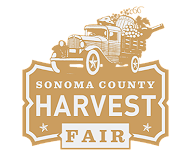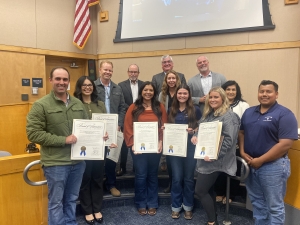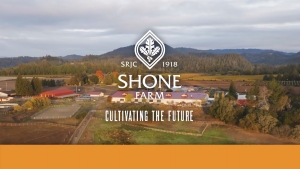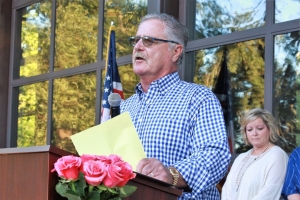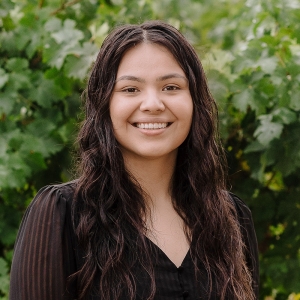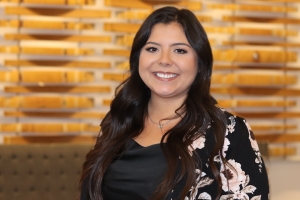2025 Agriculture Award Winners
As the cornerstone of Sonoma County’s economy and multi-generational family endeavors, agriculture is at the heart of the Harvest Fair. We are proud to honor those in the agriculture industry who work around the clock ensuring the products grown in Sonoma County are the best in the world.
Each year the Sonoma County Harvest Fair selects outstanding members of the Sonoma County agricultural community to be honored for their contributions to the preservation and enhancement of farming in Sonoma County. The Ag-Recognition selection committee is comprised of past recipients. Congratulations to all our 2025 Award Recipients!
Parliament Brewing Company, Rohnert Park
Excellence in the Craft Beer, Cider, or Spirits
Last October, Parliament Brewing celebrated five years of craft brewing and community building in Rohnert Park. The brewery is family owned and operated by Baltimore natives, Justin Bosch, brother Adam Bosch and their father, Alan. The idea for Parliament Brewing began in 2009 when Justin Bosch got out of law school and got a home brew kit. He really enjoyed science and began tinkering with recipes and brewing with friends on weekends. In 2014 he did the Master Brewers Certificate Program at University of California, Davis. After honing his skills, Justin called his brother, Adam, who was embarking on an MBA program on the East Coast. He asked him to drop business school and come to California to start a brewery with him. He did, and after recruiting their father, Parliament Brewing was born.
A “parliament” refers to two or more owls, and owls are featured prominently in the brewery’s logo. But the term is derived from the French word “parler,” or “parlement” – words closely associated with places people gather to discuss and debate. This sense of bringing people together and creating a space to gather was the motivation for the brewery and the brand. Unfortunately, the intention would prove more challenging than anticipated. After opening in 2019, the brewery welcomed guests for just 13 months before the pandemic caused the business to stop serving customers. While a difficult period for all service businesses, Adam Bosch credits this time with teaching the family how to pivot, and think about their business long-term rather than short-term. “We had a philosophy of ‘react, don’t over-react’ and that was an important lesson.” He said.
Today, the brewery is a community hub for local craft beer lovers. It is dog friendly and family friendly, has a close-knit staff, and hosts regular trivia nights and daily food truck partners. The beers are well-respected and popular and are available in an array of styles – from the traditional: Mexican-style lagers, German-style pilsners, ipas, ales and gose, to the truly unique: smoothie kettle sours and even hard seltzer. Parliament has fared well against worthy competitors the last four years at the annual Battle of the Brews event, hosted by Active 20-30 Club. The brewery won Best of Show in 2024 and 2025 and brought home the 2025 awards for Best Sour, spiced, wood, Best Hazy IPA and Best Specialty Beer.
Shone Farm, Santa Rosa Junior College
Excellence in Local Food Production
Santa Rosa Junior College’s Shone Farm is a 365-acre outdoor classroom, or “living lab” located in Sonoma County’s Russian River Valley. Named in honor of Robert Shone, longtime agricultural leader, SRJC trustee, and former president of the Sonoma County Farm Bureau, the farm is one of the largest agricultural education sites in the California Community Colleges system. Shone Farm provides students with valuable real-world experience across a variety of agricultural sciences disciplines, including sustainable agriculture, viticulture, wine production and business, natural resource management, horticulture, floristry, and animal science. The farm also supports numerous programs in the SRJC system, including botany, ecology and culinary arts.
During World War II, the property served as a military listening post. In 1972, the federal government declared the land surplus, and it was acquired by SRJC. In 1999, the SRJC Foundation’s Ag Trust Committee was established and over the years has guided fundraising efforts to raise millions through endowments, capital campaigns and scholarships. With the community’s backing, Shone Farm has thrived for over 50 years.
Today, Shone Farm features vineyards, forests, pastures, gardens, livestock facilities and wine production. Students are able to grow and produce numerous food items to be sold commercially and often manage commercial-scale crop production from planting through sale. This includes award-winning wine, olive oil, dried goods, pasture-raised meats and seasonal produce.
“Shone Farm has become a hub for agricultural education and innovation, a cornerstone of industry here in Sonoma County,” said Connor Murphy, Shone Farm Director, “it’s a real training ground for the next generation of agricultural and environmental leaders who are cultivating the future. It is so motivating to students to get this kind of community recognition.”
Shone Farm products are sold on campus and at farm events as well as to local restaurants, retailers and the SRJC Culinary Café. Members of the community are encouraged to visit the farm and wine tasting room during regular summer U-Pick events, the popular Shone Farm Fall Festival, Holiday Open House and the Spring Plant Sale. All sales of Shone Farm items are reinvested to support the academic goals of the farm.
Cort Munselle, Munselle Civil Engineering
Friend of Sonoma County Agriculture
It’s no surprise that Cort Munselle’s love and respect for the land and agriculture were fostered during his childhood, growing up and working on his family’s farm in Alexander Valley. His upbringing has proven integral to his work as a civil engineer.
In 2001, Munselle graduated from Cal Poly, San Luis Obispo where he studied ag business and agricultural engineering. He returned to Sonoma County and accepted an internship at a local civil engineering firm where he achieved quick success working on agricultural projects, often related to vineyard design and VSCO permitting for vineyards. “As a young college graduate, I didn’t realize that growing up on a working farm would impact my career as greatly as it has,” said Munselle. “I quickly learned that I could talk to farmers comfortably and explain the engineering and permitting processes because I grew up around them and worked on the family ranch as a kid. I think they felt they could trust me because of my understanding of farming practices as a result of how I was raised,” said Munselle. “It’s actually a unique ability for an engineer.”
Munselle has farming roots as deep as almost anyone in Sonoma County. His mother’s family, the Osborns (and later the Wassons), settled in the area around 1870, growing grapes and operating Alexander Valley’s first winery. Later generations focused their efforts on cultivating the land with everything from prunes and dairy cattle to vegetables and now wine grapes. Munselle and his two brothers, Bret and Lance represent the 5th generation of their family in the region and his two daughters, and an additional 6 of their cousins (all girls) make up the 6th generation. Both Munselle and his wife Mia attended Healdsburg High School and made their way back to Sonoma County after college.
In 2007, after managing entitlement projects for a home builder – a career change fortuitously thwarted by the collapse of the housing market – Cort Munselle opened Munselle Civil Engineering. In the early days, he operated out of his home and was the only employee. “It was a true family business,” he said. “I had my four-year-old daughter help stake vineyards for surveys more than once. Growing up the way that I did, failure was never an option. Farming teaches you to find a way to make it work. Engineering is similar and although starting my own business was challenging, I was taught to work hard and never give up, even if that meant asking my father-in-law to be my survey rodman when I had no other employees to help,” he said with a laugh. While starting a new business in a recession was a risk, Munselle’s perseverance, ag connections and earnest love of the land helped him build his client base, many of who were (and still are) friends and family members.
Throughout his career, Munselle has served as a valuable resource to the local ag community, volunteering on technical advisory committees and helping to interpret and negotiate ag regulations to ultimately help farmers stay in compliance. Over the years Munselle has served on boards and committees with the Sonoma County Ag Commissioner’s office, Permit Sonoma, and the California Department of Food and Ag. He has done compliance work with North Coast Water Coalition and developed and implemented frost regulation for the Russian River Tributary as well as advising on farm plans for the California Land Stewardship Institute.
In his free time, Munselle raises cattle with his brother, Bret, and farms nine acres of Cabernet Sauvignon in Cloverdale. He and his family are active in 4H, the Healdsburg Fair Board and the local livestock industry.
Mel Sanchietti, Sanchietti Ranch
Lifetime Contribution to Sonoma County Agriculture
When Mel Sanchietti was born in 1948, his family was farming their home ranch on the Santa Rosa Plains. His grandparents had settled there in 1919 after immigrating from Italy and embarked on a family farming legacy that has lasted over a century and five generations. Today, Mel Sanchietti and his wife of over 40 years, Janeen, continue to live in the same home Mel’s grandparents built in 1929. “My ranch is my hobby,” he says, “I never get tired of it.”
When Sanchietti’s grandparents purchased the Irwin Lane property it was planted to wine grapes, but the ensuing decade brought prohibition, and vineyards were no longer a viable farming business. Like many Sonoma County farmers, the Sanchiettis looked to other crops, planting prunes, walnuts, pears and apples and raising poultry. During World War II when there was an abundance of fruit on the property, Mel’s father, Gus Sanchietti, and other local farmers began selling produce on a vacant lot on Market Street in San Francisco, returning weekly and eventually establishing the San Francisco Farmer’s Market.
As Mel Sanchietti grew on the property, he farmed fruit with his dad and found that he liked be a farmer. He loved machinery. He loved dirt. As an adult, he started a small custom farming business. In 1979 he contracted with Korbel Winery to farm all their vineyards and in 1984 he purchased the family property from his parents.
In the late 90’s, at the age of 50 and after many years of contracting with Korbel (his largest client), Mel Sanchietti accepted a position at the winery as Vice President in charge of farming. In his role, Sanchietti helped purchase property and led grower relations. The role was integral to the winery at a time of expansion when Korbel purchased Kenwood Vineyards, Valley of the Moon, and Lake Sonoma Winery as well as property in the Sacramento Delta. Sanchietti held this role for 15 years before retiring.
Mel Sanchietti has two daughters, Angela and Lori, who live locally but work outside of farming. After graduating from Cal Poly, San Luis Obispo, Mel’s son, Mark Sanchietti returned to Santa Rosa. Like his father, Mark started his own farming business with his wife, Jenny. Today, Mark has over 400 acres in his own portfolio.
“Today, I work on my ranch. It’s not like a job. It’s what I love to do.” Said Sanchietti. “I have five grandchildren and they all live locally. And it doesn’t get much better than that.”
Lupita Flores, Bevill Vineyard Management
Outstanding Young Person in Agribusiness
When Lupita Flores Medina joined Bevill Vineyard Management (BVM) in 2018, it was as a temporary office worker for harvest. Within a month, BVM had offered her a full-time position. Today, Flores Medina is considered the “hub of the BVM wheel” supervising the accounting department, securing 80% of the labor force through the federal H2A program and applying her accounting, financial planning and analytic skills to handle all administrative tasks.
Flores Medina was born in Sonoma County to immigrant parents. Though she moved around as a child, her family was settled in North Santa Rosa by her early teen years. She graduated from Piner High School in 2014 and began her studies at UC Berkeley, earning a bachelor’s degree in Political Economy in 2018. “Witnessing my parents’ constant sacrifices to provide a better life for my siblings and I instilled in me a strong work ethic.” Said Flores Medina, “Because of the challenges of growing up in a low-income community with limited resources, I have always been curious about economic disparities locally and globally. I wanted to understand why Mexico’s economic conditions were so difficult that my parents felt compelled to leave their home, start anew without resources or knowledge of the language, and with no education, all to secure a better future for their children.”
These experiences, education and passion for her community have led Flores Medina to create and implement programs and procedures that ensure efficient business operations at BVM. She leverages each employee’s skill set to ensure the team’s initiatives reflect the company’s forward-thinking and supportive environment. This approach has led to real changes, including restructuring administrative roles to ensure that the person managing payroll and health insurance is a Spanish speaker who has a strong connection with vineyard employees, ensuring that they feel well-supported and do not lack resources.
“My most impactful role,” says Flores Medina, “Is overseeing the H-2A visa guest worker program. In this capacity, I am making a positive impact on Mexico’s economy, witnessing firsthand the economic improvements that remittances bring to the guest workers’ hometowns. I have also created monitoring systems to ensure that the domestic labor force is not negatively impacted by the program. This involves making domestic staff work more hours and are given priority for opportunities to advance within the company. I have navigated the challenge of efficiently utilizing external labor, necessary due to a labor shortage, while ensuring that our domestic workforce remains empowered, acknowledged, and supported.”
Flores Medina expects to continue working in agriculture, “What I enjoy most about working in agriculture—and especially at Bevill—is the people”. She said. “Growing up in Santa Rosa, I didn’t have much exposure to agriculture, but through Bevill I’ve come to see just how vital this industry is to our community. Even more inspiring are the people who make it all possible, and who continue to fight for its future despite the many challenges, from unpredictable weather to changing regulations.”
Outside of her role at BVM, Flores Medina volunteers with Sonoma County’s Winegrowers Fundación de la Voz de los Viñedos, offering Spanish translation at various vineyard employee recognition events. In her free time she spends time with family, and has been known to travel long distances just to “hang out” with family members. She is close to her younger siblings, Jose and Marbella, and enjoys strength-training in the gym. In the next couple of years, she hopes to start a family with her Fiancé, Carlos, who has been a strong supporter of her career for the past nine years. For now she enjoys time with her pets – Frenchie, Porky and cat, Tessa.
Emily Lokka, Analy High School
Outstanding Leader in Agricultural Education
Emily Lokka grew up in Eagle Point, Oregon on a sheep and grass hay farm. Coming from a family with a long history of ranching, farming and supporting ag education, Lokka grew up showing large animal livestock (sheep, hogs, cattle and goats) at a competitive level at jackpot shows, the Jackson County Fair and the Oregon State Fair each year. “I am a proud product of 4-H and FFA programs!” says Lokka, “I was extremely competitive in livestock judging and public speaking.” These experiences, along with academic achievement (Lokka graduated as valedictorian of her high school) led to a full-ride scholarship to Linn-Benton Community College and later being recruited to California State University, Chico. While working on her BA in Agricultural Sciences and Education at Chico, she worked in the meats laboratory, lived at the university farm and continued in livestock judging as a key member of the senior college intercollegiate livestock judging team.
After college, Lokka spent time working in grower relations in the vegetable industry in the Central Valley. There, she met husband, Riggs Lokka, a Sonoma County native. The two decided to make the move back to Sonoma County, giving Lokka a chance to decide next career move. “I reflected on what my biggest passions were. I came up with agriculture and teaching.” Said Lokka, “Luckily, there was a position open at El Molino High School and after touring the campus and meeting students and staff, I was hooked.”
In the years since El Molino and high schools merged, Lokka has worked with colleagues to found the new Sebastopol-Analy Ag Program and to strengthen the agricultural pathway classes, facilities and program’s impact on the community. She coaches students to show animals and compete in livestock judging and public speaking. This past February, she led the students of Sebastopol FFA to a state championship in the 2025 FFA Grapevine Pruning Championship, held at Fresno State.
“One of my favorite parts of my job is coaching.” Said Lokka, “I’m pretty proud of my ability to tailor my coaching style to each individual student. Success to one student might be competing at a local contest and getting through their speech – but success to another student might be winning a state championship. I believe that great educators meet students where they are at and guide them to reach their maximum potential.”
Outside of teaching, Emily Lokka and husband Riggs own and operate Top of the Hill Show Stock, a club lamb and goat business. The couple are partners in Emeritus Vineyards, where Riggs is the Vineyard Manager and where the Lokkas live. Lokka is a big 49ers and Giants fan, and she loves gardening, making flower arrangements and taking their dogs on walks around the vineyard.
“I love my very rewarding career,” says Lokka, “it hasn’t been easy. Our school district went through a tough consolidation, we survived teaching through Covid-19, and being an ag teacher is flat-out exhausting on most days, but I wouldn’t choose any other profession. I’ve had the pleasure of connecting with countless students throughout the years and supporting them and their wildest dreams. Like farming, ag teaching is a lifestyle and I’m so thankful for the community in my home of west county and all of Sonoma County. It takes a village to support so many amazing students in agricultural education. Above all, I am thankful for all the graduates, current students and future students that let me be part of their journey.”
